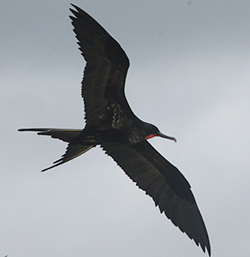The Christmas Bird Count: Old and New Traditions

****** CALLING ALL BIRDERS ************ Conservation Panama is doing a Bird Count here at the beaches. We need a minimum of 12 volunteers to join the count on Sunday Jan 18th. Meet up is at 6am at Playacommunity Office in the Rincon del Chef Plaza. To register contact Zeke at: ezekieljakub@gmail.com. He is often out in the bush doing field work with limited internet access. So if he doesn’t get back to you right away, wait. He always responds. *************************************** The Christmas Bird Count: Old and New Traditions By Ezekiel S. JakubEvery year throughout the Americas thousands of people take part in an annual bird census, called The Christmas Bird Count (CBC). The count is administered by the National Audubon Society, and the purpose is to provide population data for use in science, especially conservation biology.
Many years prior to the CBC, North Americans participated in a very different type of bird count, called the "side hunt", which took place around the same dates. In the ‘hunt’, people competed by the number of birds killed. Bird carcasses were piled high, regardless of whether the bird was beautiful, rare, or going to be eaten. In December 1900, a U.S. ornithologist named Frank Chapman, (founder of Bird-Lore -which became Audubon magazine), proposed counting birds on Christmas instead of killing them.
Over a hundred years later, today there are counts worldwide and the CBC is one of the world’s oldest and long lasting citizen science bird censuses still in operation. Each count circle consists of a 15-mile wide radius, split into territories for which teams are responsible. Each team, typically consisting of at least two individuals, count as many individual birds and species as they can spot within a 24hr period. Teams usually start right before dawn and go until they take an afternoon break whereupon they continue to count until dark. Some of the hardcore counters even setup nocturnal territories for owls and goatsuckers (i.e. the Common Paraque).
The results are by no means as accurate as a human census. Often not all the area, even in the count circles is covered. Also, not every bird along a route is seen or identified. Big flocks can't be counted precisely. Further, telling whether a bird has been counted twice can be difficult. The Bird Count rules address these problems by providing observation and counting guidelines.
Counts are generally held from December 14 to January 5, inclusive. This year, however, Conservacion Panama’s bird count team has received a nod from the Panama Audubon Society to extend the January data submission. This will allow people to participate in a Special Beach Bird Count.
Christmas Bird Counts are one way which we, as concerned citizen scientists, are able to contribute to the wide range of ornithological data. By participating in a CBC we are able to contribute population data, species-specific data, and help scientists track winter population trends. Here in Panama it is even more important because not only do we collect data for resident species, but we also get a large influx of Neotropical migrants from the northern hemisphere for which we can add to an ever increasing pool of information.
On Sunday, January 18th, Conservation Panama in cooperation with La Playa Community would like to invite you to participate in the first (and hopefully) annual Coronado Christmas Bird Count. You do not need any experience. In fact, we welcome beginners! Counters will meet early in the morning at 6am, at the Playacommunity office at Rincon del Chef Plaza in Coronado. To participate, email your interest to Ezekiel (Zeke) Jakub: ezekieljakub@gmail.com. You need to register by January 10th, so that we can determine territories, which will be assigned on the day of the count. Training will be provided before the count. A good pair of binoculars, Panama bird field guidebook, and a packed lunch is suggested. All count data will be sent to the National Audubon Society for inclusion in the international CBC database.
Participating in the Bird Count is free, however we suggest a donation to Conservation Panama’s Bird Guide Training Program in Fortuna. Donations will go towards the purchase of binoculars for graduating guides.
